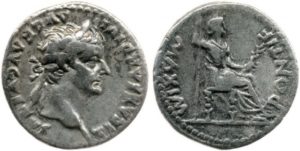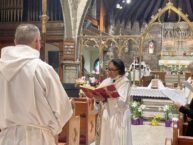 October 22, 2017: May God’s words alone be spoken, may God’s words alone be heard. Amen.
October 22, 2017: May God’s words alone be spoken, may God’s words alone be heard. Amen.
Now, you might be thinking I picked this gospel passage for today because it is stewardship season – you know, Jesus is talking about money and giving, right? Well, we read from the Revised Common Lectionary, and I don’t pick the readings – believe me, there are times I wish I could. And, sadly for the stewardship campaign, this isn’t Jesus reminding you to fill out your pledge card in support of the parish – or at least that isn’t the core of what he is talking about.
Jesus has been in Jerusalem for a few days now, and he hasn’t exactly been staying out of the headlines of the Hebrew Cable News Network. The first thing he did was the big 3T: toppling the tables in the temple, and then he got busy healing and teaching. And now the folks in power are getting a bit unnerved by all the hype around this guy, so they actually join forces – those who followed Herod, and the leaders of the temple – and in the passage today, they confront him. I guess the old saying is true: the enemy of my enemy is my friend.
These unlikely allies try to back Jesus into a corner, but first begin with flattery. Now, if a group of folks that don’t normally hang with you come up and talk about how sincere, knowledgeable, fair, and good looking you are – watch out. “Jesus, I am just LOVING that tunic you are wearing – lookin’ good, seriously…and have you been working out? Dude, that pilates is really showing. Alright now.” Okay, they never went there about his looks, but you get the idea – you would know you could trust them about as much as Darth Vader or Lord Voldemort. Anyway, after all the flattery they ask “Tell us, then, what do you think? Now, remember two weeks ago when we hear Jesus using this question – when asked by someone who is standing against you, it is likely NOT a genuine question. Anyway, they ask “Is it lawful to pay taxes to the emperor, or not?”
Jesus wasn’t taking the bait. As you likely already know from other sermons on this passage by me or anyone else it is a trap. If he said you should pay the tax, it would really tick off his followers who feel angry about having to pay this yearly tribute in thanksgiving for their own oppression. I can’t blame them, can you? But, if he said not to pay it, he would be arrested by the Romans for inciting rebellion against the state.
They tried to entrap him, but he entrapped them instead. He answers their question with a request…and then a question. He replies “Show me the coin used for the tax.” The trap is set. Then when they do, he asks “Whose image is this? What does it say?”
Notice the wording. If you were paying attention, our current translation puts this as “Whose head is this?” but the Greek was εἰκών [i-kone’] from which we get icon – whose image is this? The difference is very important – it is the very word that ensnares them. It is the very word that Jesus wants us to hear.
Why?
Now, remember that Jesus in that table over-turning scene was casting out money changers? Today we see them at international airports, right? You get your money converted into or out of the local currency. Why would anyone have to do that at a temple? Because of what was on the coins – the very coins these temple elites readily produced from their pockets – the denarius – that’s why.
Jesus just overturned another table – this time on these Pharisees and Herodians – because in producing a coin bearing this image these temple leaders have stepped in it. They have in their possession an engraved image – an image with an inscription – which Jesus has them read. On the back, this coin would show a woman seated on a  throne – the Pax Romana – with an inscription that read “Pontif Maxim” or “High Priest” and while not good to see that in the hands of temple leaders, it was the front that was their undoing. Translated, it read “Tiberius Caesar – Son of the divine Augustus.” The coin contained an idolatrous claim on an idolatrous coin – that Caesar was the son of God – and an image of that purported God. That is why there were money changers – having it in the temple would make the temple in alignment with Rome, and in defiance of God’s commandments, so they were exchanged for shekels, a Hebrew form of currency. Yet, there these folks were, temple leaders, readily able to produce one. The very possession of it indicted them.
throne – the Pax Romana – with an inscription that read “Pontif Maxim” or “High Priest” and while not good to see that in the hands of temple leaders, it was the front that was their undoing. Translated, it read “Tiberius Caesar – Son of the divine Augustus.” The coin contained an idolatrous claim on an idolatrous coin – that Caesar was the son of God – and an image of that purported God. That is why there were money changers – having it in the temple would make the temple in alignment with Rome, and in defiance of God’s commandments, so they were exchanged for shekels, a Hebrew form of currency. Yet, there these folks were, temple leaders, readily able to produce one. The very possession of it indicted them.
All this is great for developing debate tactics if you are polishing up on your rhetorical skills (something I wish many in Washington would attempt to do), but what does all that mean to us? Plenty. Because this is about who we are, and how we are to be in this world.
See, after they produce the coin and identify who is on it, and what it says, Jesus then tells them to “Give…to the emperor the things that are the emperor’s, and to God the things that are God’s.” It was a drop mic moment, and the folks there knew they had just had it handed to them in a very big and humiliating way. We already know that the coin claimed divinity in a graven form. It didn’t belong in the hands of one who followed God’s law, but the one who minted it. So the first part makes sense. But the real stunner was the second part of Jesus’ response: “Give to God the things that are God’s.” And the Pharisees at least knew they were had, for they were men who studied Torah, they knew scripture.
“Give to God the things that are God’s.”
What did the Pharisees get immediately? What are these “things” that are God’s?
Well, everything, right? Everything belongs to God, does it not? If so, then even the Emperor and his money belongs to God too. In other words paying the tax is irrelevant. What matters is that you give back to God what is God’s, and that, my friends, would also be YOU! Yes, YOU!
There was a famous preacher who was visiting a nursing home that had some patients who were suffering from age related dementia. He went around and greeted the people who were very glad to see him. He walked up to one lady and asked, “Do you know who I am?” She said, “No, but if you go to the Front Desk, they can tell you.”
One of the things about what Jesus is doing here is that he is serving as the Front Desk. Or to put it another way, he is reminding his challengers of their own identity. And that is the role of the church too.
Next week we will do what is called an Instructed Eucharist – it is a service where the sermon is actually inserted throughout the liturgy in small bits by way of talking about what we are doing, and why we are doing it. Why? Because in the Episcopal Church – we want you to question and get answers. We want you to understand as best you can what is going on here, and why you should be here, so that it will have more meaning for you. And, one of the things that will become readily apparent is that much of what we do is centered on the worship acting as the front desk for the church – which is all of us here. Because, like the Pharisees and Herodians in this story, we can lose sight of our own identity in this crazy world of ours, and it is here where we are reminded again of who we really are, and why that matters.
For example, each week during the long season of Pentecost, I say this in our Eucharistic prayer (the part following the Sanctus during communion): “Blessed are you, gracious God, creator of the universe and giver of life. You formed us in your own image, male and female, and called us to dwell in your infinite love. You gave the world into our care that we might be your faithful stewards and show forth your bountiful grace.” This prayer, and it is a prayer, is reminding us who we are, and what we were created to do.
We are made in the image of God – male and female (a reference to Genesis 1:26).
Now hear Jesus’ response to them again:
“Give…to the emperor the things that are the emperor’s, and to God the things that are God’s.”
The coin had the emperor’s image on it – give it to the emperor. We have God’s image on us – what are we to do then?
Here’s the thing, Jesus is imploring us to remember who we really are – beloved children of God. That can be difficult to remember sometimes when our own earthly identities feel lost to us – smashed on the rocks of divorce, death, loss of job, loss of mental or physical health. The depth of pain that can be felt when we feel that we don’t know who we are anymore is beyond our imaginations…until it happens to us.
We can also begin to believe that who we are is defined by others – by those who love us, and by those who don’t. By the money we make, or the friends we keep, or the titles we hold.
It is for these reasons that we must remember that no matter what happens to us in this life, nothing can change who we are, who we really are – children of the living God – loved beyond all measure.
What is God’s is all that we are – we are God’s and so is every woman, man, and child on this earth – and the animals – and all that they and we inhabit – all of it is God’s given into our care. So how do we give back to God what is God’s when all of it belongs to God? We do this through our worship, and in living out our lives mindful of our identity. Because it is impossible to marginalize, oppress, or abuse ourselves, this earth, or any of it’s inhabitants when we remember that they and we are of God. The Mexican and the Nigerian, the Muslim and the Jew, the gay couple, trans teenager, or elderly straight couple, the walrus and the snake, the seas and the forests, and YOU – all of these belong to God, are entrusted to our care, and we must give ourselves to God and the work She calls us to do in Christ’s name.
Notice too that Jesus didn’t call out these folks as defiling God, or blaspheming God. No, he called them hypocrites because they were living in defiance of who they really were…or perhaps they had forgotten who they were. Jesus was holding up a mirror.
We forget who we are when we abuse one another.
We forget who we are when we stand silent when another part of God’s world is abused.
We forget who we are when we abuse ourselves.
And it is here, in this place, where we are reminded of our identity, and where we are given the nourishment we need to live into Jesus’ call to give to God what is God’s. The church itself is not this building, but all of us – it is a living part of the body of Christ – and we also must, as a community, remember who WE are if we are to give back to God what is God’s, and how that is different from what belongs to the empire of our day. Because what we do matters, and what we don’t do matters too.
The Rev. Dr. Martin Luther King, Jr once said “The church must be reminded that it is not the master or the servant of the state, but rather the conscience of the state. It must be the guide and the critic of the state, and never its tool. If the church does not recapture its prophetic zeal, it will become an irrelevant social club without moral or spiritual authority.”[1]
If we, as the church today, are to avoid being like the hypocrites Jesus is dealing with in this passage, than we cannot just come here for comfort and coffee hour. Dr. King was right, this church isn’t a social club. Our identity, both individually and collectively, give us a purpose, and we must live that out. We must give to the emperor what is the emperor – and sometimes that is prophetic witness – truth they don’t want to hear.
We cannot be fearful to say what needs to be said from this pulpit or in the streets.
We must never lose our prophetic voice over fears that we might offend someone.
We must be willing to risk people walking out our doors, if we are ever to make those doors welcoming to those in the shadows.
Today, as part of our Stewardship campaign, each of you will receive a gift blessed at the altar. Today it is chocolate coin – you know, the kind you’d get as a kid? The coins are wrapped in silver or gold and look like our coins – with the image of a President on it. When you look at this coin – well, for as long as you are able to avoid eating what’s inside anyway – may it be a reminder of the ways in which this parish has helped you refocus and remember who you really are. And, let it also be a reminder to you of whose image we are made, and what we do with that knowledge.
Are we giving ourselves to God in what we do, what we say, and how we live? Or do our actions in the world defy the image of God we bear?
If we hear nothing else today, let us all remember this, because it all boils down to this: God created us and all of life. God loves us – every one of us, and all of creation, beyond all measure. If we can embrace this knowledge of who we really are – beloved children of God – if we stay grounded in that identity – all the rest will follow.
You are made in the image of God.
Give back to God what is God’s.
Every moment of every day – for your sake, and the sake of the world.
Amen.
For the audio from the 10:30am service, click here:
[1] Martin Luther King Jr., Strength to Love (Fontana, 1972), 62.
Rev. Diana L. Wilcox
Christ Church in Bloomfield & Glen Ridge
October 22, 2017
Pentecost 20 – Track 2
1st Reading – Isaiah 45:1-7
Psalm 96:1-9, (10-13)
2nd Reading – 1 Thessalonians 1:1-10
Gospel – Matthew 22:15-22






